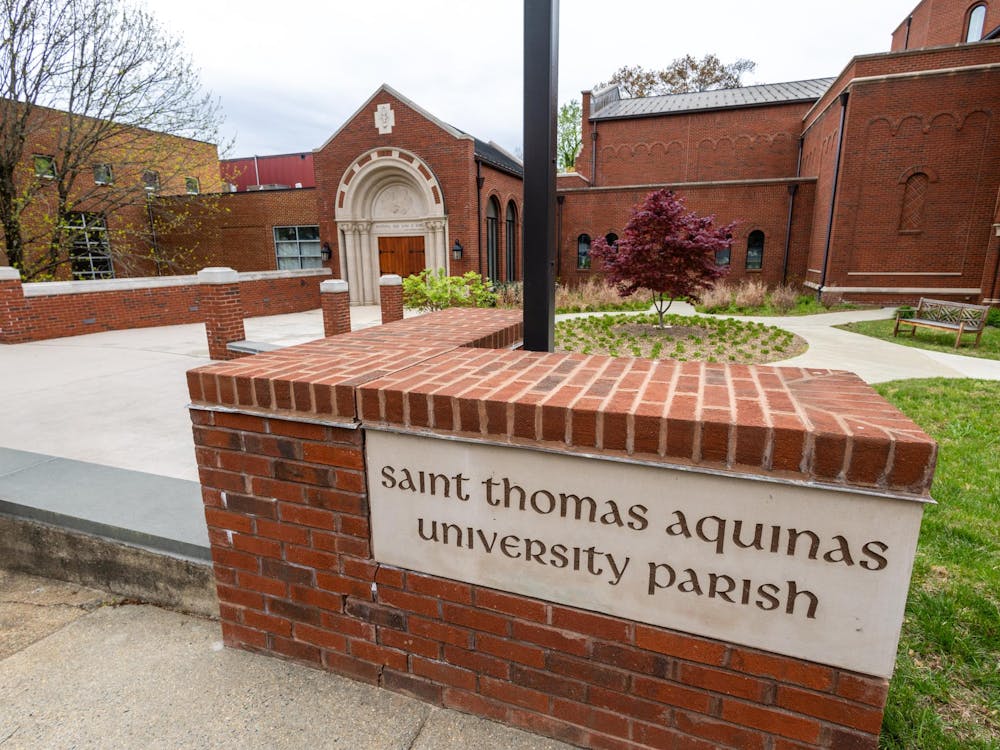U.S. Sen. John Cornyn, R-Texas, spoke in the Rotunda Monday on the role and challenges of Congress in American democracy in an event hosted by the Karsh Institute of Democracy. Cornyn spoke about President Donald Trump and his administration’s policies, saying that the president dominates today’s political discourse and is overshadowing the actions of Congress.
Throughout the conversation, Cornyn emphasized the critical role of Congress in lawmaking, federal funding and balancing the powers of the president. He also discussed the challenges faced by Congress that include garnering the American people’s trust and confronting the newer dynamic of “party sorting” due to polarization that increases the difficulty of building consensus and driving policy making.
Mary Cate Cary, Politics Professor and director of Think Again U.Va. — an initiative that focuses on student-facing events to promote freedom of expression and viewpoint diversity — served as moderator.
The Karsh Institute is dedicated to confronting the challenges of democracy by engaging the public and influencing policy. The event was part of the institute’s ongoing series “Congress — a Cornerstone of Democracy,” which brings in political leaders to speak from across the ideological spectrum.
John Nau, Board of Visitors member and native Texan, provided an introduction for Cornyn. Nau recognized Cornyn's long history of service to Texas in his work as a district judge, Texas Supreme Court justice and Texas Attorney General. Cornyn has served in the Senate since 2002 and belongs to the finance, judiciary, intelligence, foreign relations and budget committees.
Cornyn lost the election for senate majority leader to Sen. John Thune, R-S.D., in February. He recently announced his campaign for reelection in the 2026 midterms, potentially facing a primary challenge from Texas Attorney General Ken Paxton.
According to Cornyn, the ability to reach a common consensus has ebbed and flowed in his over 20 years in the Senate — it depends on the mood of the American people and how content they feel with the current government. He said that Trump’s recent actions have overshadowed Congress’s ability to pursue a consensus on key issues.
“President Trump's remarks on the national scene has [sic] obviously been the dominant story and sort of overshadows pretty much everything else,” Cornyn said. “The truth is that over the years, Congress has delegated way too much authority to the executive branch.”
First-year College student Keira McCovik said she appreciated Cornyn’s acknowledgement of the importance of American democracy’s system of checks and balances.
“I do think [Congress] has a large role with checks and balances,” McCovik said. “Now more than ever, it’s very important to be checking the executive branch.”
Part of Congress’s over-delegation to the executive branch is intentional, Cornyn said, due to Congressional members’ incentive to be re-elected and remain in favor of executive powers. According to Cornyn, Congress needs to reclaim some of those surrendered authorities like the installation of tariffs, but he doubts President Trump would sign a bill allowing these efforts to come to fruition.
And while Trump may have more of a say on issues like tariffs than Cornyn would prefer, Cornyn said the American people elected Trump to this position after reacting to former president Joe Biden's administration. Cornyn said that democracy is built on reactions and re-examinations of our current political moment, which are initiatives driven by the American people. He said this form of democracy depends on people being aware and motivated to participate and insist on change.
Trump’s election in 2024 was in part due to the help of working class voters who vote less often. Cornyn said that Trump needs to appeal to those voters as opposed to elites, who are already well off.
“This is [working class voters’]] moment to come back and make sure that the government and Congress and the presidency focus on their needs, not the needs of the elites,” Cornyn said.
Honing into Americans’ perception of Congress, Cary described that most Americans disapprove of the job Congress is doing, yet simultaneously hold high approval for their own Congress member. Cornyn gave his explanation for this viewpoint, highlighting the sense of familiarity constituents feel with their representatives.
“I think the explanation is that the people they know, they trust. People they don’t know, they don’t trust,” Cornyn said.
Cornyn said that in reaction to this difficulty that comes with the diversity of the country, many Congress members do not make an effort to work across party lines and collaborate productively.
“This is such a big and diverse country … the amazing thing about Congress is it forces us to work together sometimes, but it’s hard to build a consensus,” Cornyn said.
He said that these senators and representatives may also have ulterior motives for holding office other than bridging divides to create policy — he listed being on cable TV or creating an influential social media presence as alternative incentives.
“[Many senators] don't really come to it with the idea that ‘I'm here to solve problems and to reconcile differences and build consensus,’” Cornyn said. “Again, that's hard work, which is the reason why some people seem to be positively allergic to it.”
Cary brought up how Congress has been a source of landmark legislation in the past due to its composition including conservatives, moderates and liberals. With this configuration, either side could “pick up people” from the middle to get the majority. She posed the newer phenomenon of party sorting, in which the moderate faction has shrunk as polarization has taken hold.
Cornyn agreed that the phenomenon of party sorting is relevant in Congress as well as in the recent presidential election, when six battleground states basically decided the presidential election. He said that party sorting becomes especially relevant in the redrawing of districts every 10 years.
“[The phenomenon] is certainly true of the House with the advent of computers and modern software and the ability to draw precinct districts,” Cornyn said. “The party in power tends to consolidate their power, not reach out.”
Cary also asked about the recent controversy surrounding the Department of Defense and the Signal group chat when a prominent journalist was added to the group chat in what constituted a breach of national security and intelligence. Cornyn said that leaders must be continually vigilant of adversaries that are working to access such private information.
“It worries me that anybody … presumes that a commercial messaging device is secure,” Cornyn said. “We know our adversaries are constantly looking for ways to get access to that information … We just need to know what are accepted practices and what are not from the standpoint of national security.”
Speaking to another controversy coming out of the Trump administration with billionaire Elon Musk’s Department of Government Efficiency, Cornyn said he agrees with the foundational goals of the program and wishes it could exist in a less divisive environment.
“I personally think some of the stuff that [Musk] and [DOGE] have uncovered have been outrageous and egregious expenditures and wastes of taxpayer dollars,” Cornyn said. “There's necessarily going to be some disruption [and] delay, which are causing a lot of people angst.”
Karly Scholz, fourth-year College student and student representative at the Karsh Institute, said she appreciated the opportunity to hear from Cornyn and Congress’s work in bridging party lines.
“I think that Congress is doing some good work in finding common ground, and oftentimes, we hear about the trouble they're having and divisive myths,” Scholz said. “Hearing John Cornyn and hearing the common ground [senators] are finding in person, I think, is a really special thing for students to get to do.”
Finding a common ground in Congress depends on multiple factors, Cornyn said. He reemphasized his point that Congress’s ability to build a consensus across party lines ebbs and flows over time. Ultimately, he said democracy’s power lies in the people’s engagement in their government.
“It's this constant dynamism in the system that is both discouraging and encouraging at the same time,” Cornyn said. “The great and most powerful thing about democracy is our ability to course correct, because ultimately, the power comes from the people, and it's not in the government telling us what to do.”







